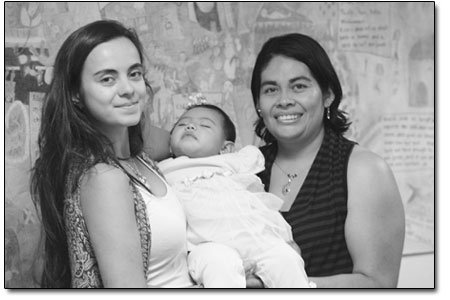|
| ||
| Birthing diversity
by Christine Rasmussen
Funded by a grant from the Colorado Trust to foster immigration-integration programs, the La Plata Unity Project (LPUP) works to identify needs of diverse groups, foster dialogue and take steps to create a healthier community for everyone. The idea for interpretive services came about through the monthly meeting of the Unity Project’s Community Access Committee, made up of service providers in the area. According to LPUP Coordinator Crystal Harris, the original idea was to offer basic interpretive services. However, after seeing initial success, lead interpreter Mariel Sholes noticed a particular need for pregnant women. “So we decided to have prenatal trainings, where interpreters actually practice delivery-room scenarios,” she said. The trainings include review of useful vocabulary for specific situations. The core prenatal interpreter group consists of six volunteers, with about 20 total in the pool, some representing languages other than Spanish. The Unity Project partners with San Juan Basin Health’s Prenatal Department and Mercy Medical Center to get the word out about its extensive interpreter services. This summer, the prenatal interpreters aided in the delivery of eight babies. Interpreters first meet with clients close to delivery, sometime after 36 weeks. “Everything is confidential,” said Sholes. “Once they stop seeing the midwives at San Juan Basin Health and are ready to deliver, we are on call.” The interpreters are there to help patients through the entire process, from admittance all the way through examinations – anywhere language is needed, even in the operating room for C-sections. If there are extenuating medical issues, the interpreter will stay with the client or at least be available by phone. On discharge day, interpreters return to assist with paperwork. “We make sure they leave the hospital with all the papers so the baby can be a U.S. citizen and have a Social Security number, and mom is pointed in the right direction,” said Sholes. Harris said the training is based in professionalism. “It’s really client-centered, so the clients can get all the information they need,” she said. “Since these ladies have had an opportunity to build a relationship beforehand, it’s extremely helpful for everyone involved.”Although the training covers setting interpreter-client boundaries, they can be difficult to adhere to in unpredictable situations like labor. “The scenario is different every time, so you have to be prepared for anything,” said Sholes, recalling a situation where a baby was almost born in the bathroom at the hospital, because the woman could not get up from the toilet due to exhaustion. “You turn into their coach, not only their interpreter. Suddenly, it’s just the pregnant woman and you, and it’s the most beautiful thing.” Having the interpreters present makes a huge difference for patients, according to Heidi Thorsness, director of the Family Birthing Center at Mercy Regional. “They have been a heaven-sent gift,” Thorsness said. “The patients are more at ease. We have several Spanish-speaking staff, but it’s always hit-and-miss as to who’s on. Even though there is often an English speaker with the patient, we can’t know what their translating skills are, especially with males when it comes to women’s body parts. “Anybody who is more informed about what’s going on will do better in the long run,” added Thorsness.The interpreter volunteer pool also focuses on giving presentations to medical providers, which has been well-received thus far, said Harris. “The challenge we face is that there is obviously a bigger need than a handful of volunteers can provide in our community,” she said. “So, we look for ways to build capacity by creating awareness and training health providers and encouraging bilingual hiring.” As the grant is set to run out in early 2012, Unity Project facilitators are evaluating current projects as they look ahead. “The grant will be the last one of its kind in the state, because the Colorado Trust is moving on to access to health, which kind of ties into this,” said Harris. “Our job now is looking at the projects that have been successful at filling the gaps in the community and looking for funding to sustain that.” To keep the Unity Project going, more people need to get involved, according to LPUP Outreach Coordinator Grisela Picassa. “We all share this community, and this is something the entire community needs, including the service providers, because they are getting paid to serve these people,” she said. “If more people start chipping in, we will find ways to keep it sustainable.” •
|
In this week's issue...
- May 15, 2025
- End of the trail
Despite tariff pause, Colorado bike company can’t hang on through supply chain chaos
- May 8, 2025
- Shared pain
Dismal trend highlights need to cut usage in Upper Basin, too
- April 24, 2025
- A tale of two bills
Nuclear gets all the hype, but optimizing infrastructure will have bigger impact



 Giving birth can be a stressful event in itself, particularly for first-time mothers. Imagine not fully understanding what is happening to your body, let alone what is going on around you in the delivery room. Thanks to the La Plata Unity Project and its volunteer interpreter program for expectant moms, labor doesn’t have to be such an uneasy experience for non-English speaking patients.
Giving birth can be a stressful event in itself, particularly for first-time mothers. Imagine not fully understanding what is happening to your body, let alone what is going on around you in the delivery room. Thanks to the La Plata Unity Project and its volunteer interpreter program for expectant moms, labor doesn’t have to be such an uneasy experience for non-English speaking patients.